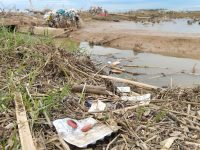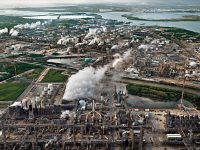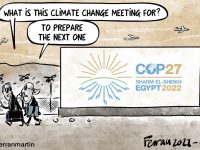Education in times of climate change
Facilitating learning to build a culture of climate-protection
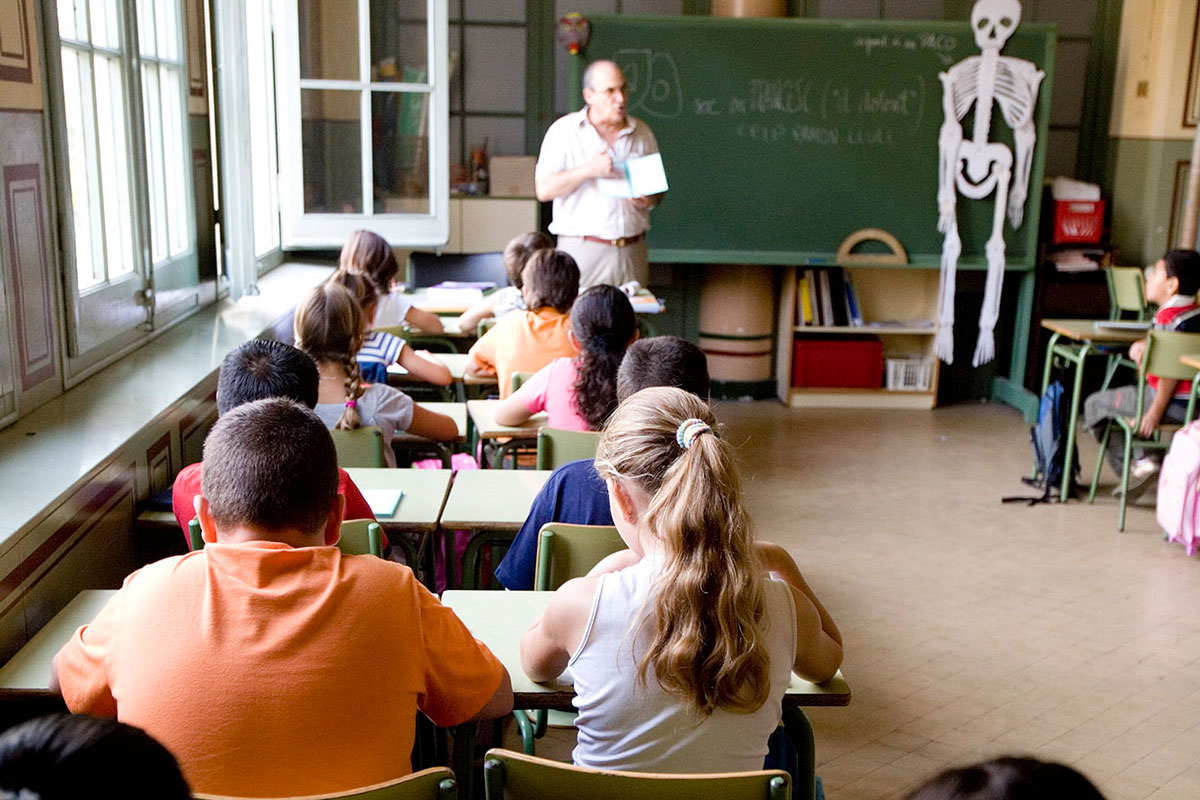
Climate change presents significant educational challenges: it is necessary to know about its causes, to recognise the roots of the problem and to be aware of its consequences. This is necessary to build a more realistic perception of climate risks and better understand our vulnerabilities. But it is especially important to know about the solutions; urgent training is needed to build a «low-carbon» culture to prevent dangerous interference with the global climate. Educational institutions – both formal and informal – must consider their contribution to these needs for knowledge and social change, because climate change will impact our future heavily and because everyone plays a role in the complex network of responsibilities that fuel it.
Keywords: environmental education, climate change, low-carbon culture.
As society has been increasingly confronted with the observable realities of climate change and heard of the dangers that scientists claim lie ahead, climate change has moved from being predominantly a physical phenomenon to being simultaneously a social phenomenon.
(Hulme, 2009, p. 25)
A broad and profound change
The Intergovernmental Panel on Climate Change (IPCC) published its latest reports in 2013 and 2014 (IPCC, 2014). It is a formidable compilation of knowledge on the physical basis of climate change, the risks and impacts resulting from it and the options available to mitigate and adapt to it. The reports drew their usual conclusions: in order to prevent a dangerous climate change, it is essential to substantially reduce the human contribution to greenhouse gas emissions, as they are the driving force of the phenomenon. Such a reduction seems to be possible only if we profoundly reconsider the current carbon-based energy production system. To show the extent of the required change, Christiana Figueres, Executive Secretary of the United Nations Framework Convention on Climate Change, recently declared (Reuters, 2014) that limiting global warming to the levels agreed in UN-supported negotiations «means that three quarters of the fossil fuel reserves need to stay in the ground».
«It is essential to substantially reduce the human contribution to greenhouse gas emissions»
But the change in energy culture that we require in order to slow down climate change, already being studied by governments and international institutions, affects not only the way we produce energy, but also the way we use it. The transition to a low-carbon world, where human activities do not necessarily involve massive CO2 or methane emissions, demands rethinking agriculture and our food supply, as well as industry, transport, housing and leisure activities, because today all those sectors are based on the intensive use of fossil fuels.

Future climate scenarios will be different from the ones we know now. Issues such as such as the availability of water, the frequency of heatwaves or the odds of contracting some infectious diseases will change. / Photo: Teo Ruiz – SINC
On the other hand, climate change carries enormous inertia and, due to the huge quantities of greenhouse gases released into the atmosphere since the beginning of the Industrial Revolution, we know some change is already unavoidable. This means that future climate scenarios will be different from the ones we know. They will change – and are already changing – essential aspects of our well-being, such as the availability of water, the geographical distribution of animal and plant species, the frequency of heatwaves and the likelihood of contracting some infectious diseases.
Levels of education and beliefs about climate change
Education has traditionally been an instrument to facilitate the adaptation of people and societies to changing world circumstances. When facing the formidable challenge posed by climate change, we must ask ourselves: Is the education system fulfilling that strategic role as an adaptive mechanism?
In the framework of the project «La sociedad ante el cambio climático» (“Society before climate change”) (Meira, Arto, Heros, Montero e Iglesias, 2013), several public opinion studies were carried out – in 2008, 2010 and 2012 – to explore the basic beliefs of Spanish people in relation to climate change: whether or not the phenomenon is considered real, the causes attributed to it, the assessment of the risks involved and whether or not the population thinks it needs to be addressed. It may be surprising, but in most cases no significant correlation was found between the opinions of the people surveyed and their level of education. The connection was weak even for items that were specifically oriented to measure basic knowledge on the causes of climate change.
Studies in other countries suggest a complex relationship between educational level and beliefs about climate change (Hamilton, 2010). In any event, everything seems to point to the fact that the education system is not yet succeeding in conveying the characteristic features of climate change to society.
What should we know about climate change?
To begin with, climate change cannot be addressed as a subject separated from the lives of teachers and students, because it will remarkably affect our future and because we also play a role in the complex web of responsibilities that feed into it.
Seemingly innocuous everyday actions, such as starting the engine of a vehicle, turning up the heating in our house and so many others have unimagined repercussions when carried out at the same time by millions of people all around the planet. They all contribute to the increase of greenhouse gas concentrations in the atmosphere.
«Knowing the solutions lets us see climate change not as a depressing dead end»
Given this reality, educational content in our classrooms is often presented in a highly abstract and decontextualised way. Outside nursery and primary schools, content is rarely organised around areas of natural interest for students, or around topics related to their experiences. This kind of education, which alienates the student from knowledge, is clearly inadequate to address climate change, because it is neither a mere scientific curiosity nor an unavoidable disaster that we need to stoically withstand: every choice in our everyday tasks, work or social and political lives can make a difference.
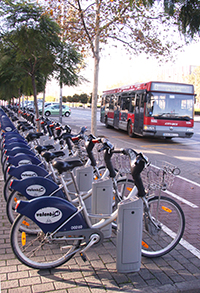
In order to slow down climate change, a change is required in energy culture to affect energy production and consumption. We need a transition to a low-carbon world, where human activities – such as transport, industry or food supply – do not necessarily involve massive CO2 emissions. / Photo: Irene Yuste
A remote depiction of the phenomenon or simply seeking someone to blame are not appropriate options. Education, good education, must find a new space not only to facilitate knowledge, but also to nurture responsibility. From this perspective, it is necessary to reconsider what we know about climate change.
In case there is still any doubt, the challenge is not only to recognise the phenomenon. It is necessary to know its causes, so that we can identify the roots of the problem, and address its consequences. We need to build a more realistic risk perception and understand our vulnerabilities. But, more than anything else, we need to know about the solutions. Investigating possible options to progress towards a low-carbon world puts us on the trail of the required knowledge to face climate change. Just as importantly, it conditions how we perceive the problem and how we stand against it: knowing the solutions allows us to see climate change not as a depressing dead end but as an enormous social challenge that we can tackle. It makes it easier for us to abandon our self-image as passive victims and become active agents.
From a disciplinary perspective, we cannot deny that climate change presents great challenges for earth sciences and technology. However, climate change should not be understood only as a body of knowledge ready to be incorporated into the teaching of sciences. Understanding climate change and its challenges depends on considering questions such as individual and collective responsibility, solidarity with future generations and sharing the risks and efforts of mitigation and adaptation. Education must include contributions from psychology, sociology, law, economics, politics and ethics, which bring us closer to the «social phenomenon» referred to in the quote that opens this article.
We also need to unlearn
Immersed in a society based on the intensive use of fossil fuels, unlearning is just as important as learning in the educational process. It will be necessary to critically assess customs and ways of life, widely accepted ideas and evaluations based on an unbiased vision of energy consumption.
In order to achieve that, the educational system must provide new analytical tools, such as the concept of carbon footprint, which quantifies emissions associated with different options, products or services and allows the creation of a culture of moderation to support our choices.

Education is an instrument to facilitate the adaptation of people to the changing circumstances of the world in which we live. We must ask ourselves what the role of the education system is in relation to climate change. / Photo: Irene Yuste
The education system must also help to clear up misunderstandings (Choi, Niyogi, Shephardson & Charusombat, 2010). One of the best examples of this is the confusion of the terms weather and climate, which are the basis for countless mistakes in the interpretation of climate information. Many people find it difficult to differentiate both terms, and climate change deniers take advantage of that; jokes about the latest great snowfall are a good example of this, and they have become a classic in North American conservative media.
Another concept that should be clarified as soon as possible is uncertainty. The defence of climate change inaction is frequently based on the notion that «we should wait until we know enough». Uncertainty is a concept with different connotations in the field of science and in popular culture. Doubt is part of the scientific method, but uncertainty in science can be delimited (not all knowledge is subject to the same level of uncertainty) and estimated, which makes it easier for experts to make a decision. Recognising the limitations of our knowledge does not imply giving up acting.
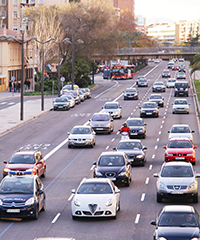
Every choice in our everyday lives can make a difference. Everyday actions, such as starting the engine of a vehicle, have unimagined repercussions when carried out at the same time by millions of people all around the planet. / Photo: Irene Yuste
Placing hope in the next generation: a bad idea
It is necessary for education to contribute to correcting our problems in adapting to the environment, promoting, for instance, environmental responsibility or better action in the fields of energy conservation or waste management. When this occurs, many believe that «there is no hope for adults» and that we should trust that «the next generations will do it better». However, nothing is farther from this notion when we advocate for an education system that facilitates the understanding of climate change and enables people to tackle its challenges. Considering the scale and dynamics of this change, placing the weight of responsibility on the next generations to transform lifestyles is too easy… and quite naïve.
The ability of education to introduce new ideas and attitudes against the current tide is often overrated, because education feeds largely on the perceptions, values and priorities of the society in which it exists and also because the world sends out its own messages, which have the credibility of what is real.
«It will be necessary to critically assess customs and ways of life based on an unbiased vision of energy consumption»
But there is another compelling reason to avoid thinking in this way: the time to react to climate change is limited. Today’s emissions are already compromising tomorrow’s climate, so the room to manoeuvre is reduced. According to Chris Field, an ecology expert who recently received the Knowledge Frontiers Award from the BBVA Foundation (Corbella, 2014): «The longer we take to act, the more difficult it will be to solve the problem of climate change, the more expensive the solution and the more dangerous the risks.»
Who needs education? Who must provide it?
We all need climate change education. However, given this dangerous situation in which we find ourselves, with time against us, it is clear that those who hold the keys to changing our energy future need to learn fast. From an educational perspective, urgent changes are required in higher education and in ongoing professional training, particularly in the fields of public and business management.
Our city councillors need to know the best mitigation and adaptation policies to apply at the local level. Architects must learn to build zero (or near zero) energy buildings. Those responsible for water management must learn to use the whole range of useful measures to promote savings and efficiency because, over the next decades, the availability of water will decrease substantially in most of Spain. People responsible for risk prevention must know the trends regarding extreme events, their risks and vulnerability implications.
«The creation of a low-carbon culture is not a priority in our education system today»
In this regard, it is necessary to renovate not only the formal education system, but also the systems through which new knowledge about the mitigation and adaptation to climate change is shared. In order to do that, we must create or reinforce: learning and action networks (e.g. the Spanish Network of Cities for Climate); structures that facilitate the exchange of knowledge between peers and the social production of knowledge; systems of learning through action.
In the area of responding to climate change, there are inspiring experiences and initiatives as well as the continuous generation of practical knowledge. Accordingly, teaching should also be understood as a shared responsibility. There are municipalities that have applied and evaluated mitigation and adaptation measures against climate change for years; architects who build «zero emission» (or near zero emission) homes; management teams who have applied water conservation policies for decades to better adapt to the availability of resources and to be less vulnerable to droughts; and groups of people who learn and support each other in the transition towards a «low-carbon» life.
As a consequence, we have to also promote social learning systems. Technical and professional networks must reinforce their educational focus and we need to build or improve the systems that integrate learning and action for climate care.

There are many local initiatives that attempt to mitigate the phenomenon such as architects who build homes with nearly zero gas emissions or water efficiency policies. In the picture, a parking spot for electric cars at the University of Valencia. / Photo: Irene Yuste
Where to start?
In the field of formal education, we have a set of classic tools to promote changes in educational action, such as curricular changes, improvements in textbooks, the development of new didactic designs, the creation of support programmes for new solutions to climate change and energy production, didactic research, and, of course, educator training. After all the educator is the basis for the quality of an education system, and what we learned yesterday may no longer be useful tomorrow.
Interesting initiatives are being developed in all these fields, although most of them are very specific and do not affect the education system as a whole. Some regions, for instance, have started specific programmes to facilitate addressing climate change in primary or secondary education. There is the KiotoEduca programme in Andalusia or the Climántica programme in Galicia. These programmes provide educator training, teaching units and work material to facilitate educational action.
In the area of graduate and post-graduate education, there is a growing choice of courses, both on site and distance learning, on topics such as emission inventories and carbon footprint, climate change economy, international climate negotiations, renewable energy and energy efficiency.
Meanwhile, in the area of ongoing training, some public administrations have started offering further education courses focusing on the adaptation to climate change.
Learning and exchange networks have also been created, like the aforementioned Spanish Network of Cities for Climate, launched by Spanish Federation of Municipalities and Provinces (FEMP) with the help of the Ministry of Agriculture, Food and Environment or a more modest one, the «Responses to climate change from education and communication» network, managed by the National Centre for Environmental Education and the Spanish Office for Climate Change, which brings together over a hundred communicators, educators and social scientists.
However, we have to acknowledge that these initiatives, although valuable, are but timid advances when compared to the scale of the change we need. Everything seems to indicate that, in general terms, today’s students and workers learn about energy and climate in a similar way to those who studied and worked decades ago. The creation of a low-carbon culture is not a priority in our educational system today. Even climate change as a global phenomenon has not achieved a substantial relevance in our curricula.
Final considerations
The responsibility of putting in place the necessary solutions to avoid a more dangerous climate change cannot be placed only upon the education system; a large-scale change of orientation will require society to change its priorities by accepting the challenge of moving toward a culture of climate care.
«It is not only possible to have an education system that faces the challenge of climate change: it is necessary and unavoidable»
Nonetheless, an education system that lets us face the challenge of climate change, that helps us to mitigate it and adapt to its effects, that make us responsible for the required transition is not only possible, it is necessary and probably inevitable. In this regard, educational institutions and educators must consider what their contribution will be to one of the greatest educational challenges of the twenty-first century, and decide whether they are prepared to address it.
It seems likely that those institutions that do not include new knowledge, that strictly compartmentalise subjects without coordination or shared interest centres, will find it more difficult to offer the answers that are needed.
The «closer look» at climate change that education will provide will sometimes be uncomfortable but good education drives us out of our comfort zone and allows us to recognise our own potential (and, therefore, our responsibilities). This is the education that would help us to address the huge challenge of climate change. Will we ever have it?
REFERENCES
Choi, S., Niyogi, D., Shephardson, D. P., & Charusombat, U. (2010). Do Earth and environmental science textbooks promote middle and high school students' conceptual development about climate change? Textbooks' consideration of students' misconceptions. American Meteorological Society, 91, 889–898. doi: 10.1175/2009BAMS2625.1
Corbella, J. (2014, 12 de desembre). Chris Field: "Somos una generación egoísta". La Vanguardia. Retrieved from http://links.uv.es/ScWgRr6
Hamilton, L. C. (2010). Education, politics and opinions about climate change evidence for interaction effects. Climatic Change, 104(2): 231–242. doi: 10.1007/s10584-010-9957-8
Hulme, M. (2009). Why we disagree about climate change. Understanding controversy, inaction and opportunity. Cambridge: Cambridge University Press.
IPCC.(2014). Climate change 2014. The synthesis report. Core Writing team, R. K. Pachauri, & L. A. Meyer (Ed.). Geneva: IPCC.
Meira, P. A., Arto, M., Heras, F., Montero, P., & Iglesias, L. (2013). La sociedad ante el cambio climático. Conocimientos, valoraciones y comportamientos en la población española, 2013. Madrid: Fundación Mapfre.
Reuters (2014, 3 d'abril). La ONU exige cambios rápidos en la industria del crudo y gas. Reuters España. Retrieved from http//links.uv.es/rP4J4zf

